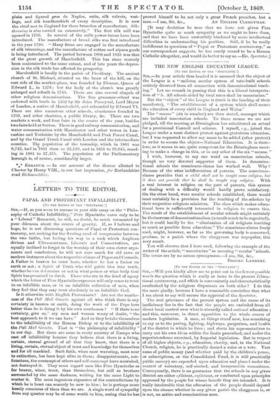LETTERS TO THE EDITOR.
PAPAL AND PROTESTANT INFALLIBILITY.
(To THE EDITOR OF THE "SPECTATOR."] SIR,—If, as you seem to assume in your able essay on the "Philo-
sophy of Catholic Pere Hyacinthe cares only to be a " Liberal " Romanist, he will, no doubt, be much tormented by your dilemma about the centre of gravity, if, as I believe and hope, he is not discussing questions of Papal or Protestant con- troversy, not seeking for the floating sand of compromise between the two faiths, but feeling his way to a rock which Anglican divines and Ultramoutanes, Liberals and Conservatives, are equally inclined to forget in the worship of their own clever argu- ments and conclusions, he will not care much for old saws or modern instances about the respective claims of Popes and Councils. A Father in heaven lie must have, whether lie has a father on earth or not ; a Spirit of Truth who will guide him into truth, whether he can determine or not iu what person or what body that Spirit has promised to dwell. Those who are in the kind of agony which the letter of Pere I Iyacinthe expresses will only cease to trust in an infallible man, or in an infallible collection of men, when they feel that they may trust absolutely in an Infallible God.
Is it otherwise with English Protestants ? Are not the anathe- mas of the Pall Mall Gazette against all who think there is any certainty in heaven or earth, doing the work of the Pope here better than he is doing it by his own anathemas ? "If there is no certainty, give us," cry men and women weary of doubt, "the best approach to it we can have." And so they betake themselves to the infallibility of the Roman Bishop or to the infallibility of the Pall Mall Gazette. That is "the philosophy of infallibility" in our day. But there are some in every country of Europe who cast off infallibility because they believe that there is a living, certain, eternal ground of all that they know, that there is a living, certain, eternal object of trust and knowledge for themselves and for all mankind. Such faith, when most wavering, most near to extinction, has been kept alive in them; disappointments, con- futations, the contempt of others and self-contempt have nourished, not destroyed it. They must regard men like Pere Hyacinthe as far braver, wiser, truer, than themselves, but still as brothers surrounded by the same darkness, waiting for the same Light to scatter it. The most ingenious exposures of the contradictions by which he is beset can scarcely be new to him ; he is perhaps more keenly conscious of them than we are. A single word of sympathy from any quarter may be of some worth to him, seeing that he has proved himself to be not only a great French preacher, but a [It may doubtless be true that we have not given Pere Hyacinthe quite as much sympathy as we ought to have done, and that we have been unworthily hindered by mere intellectual difficulties in understanding his position. Still, if he be really indifferent to questions of "Papal or Protestant controversy," as our correspondent suggests, he has surely ceased to be a Roman Catholic altogether, and would do better to say 50.—ED. Spectator.]






























 Previous page
Previous page